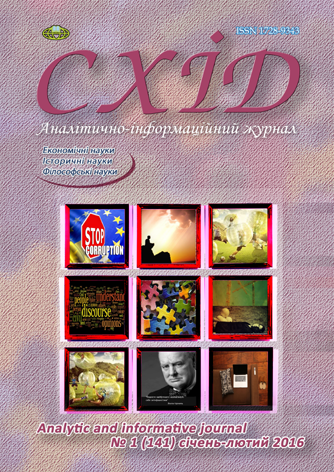Understanding and power of discourse
DOI:
https://doi.org/10.21847/1728-9343.2016.1(141).64831Keywords:
discourse, discursive practice, understanding, realityAbstract
The author makes a hermeneutic analysis of the concept of discourse. It is stated that each individual discourse shapes its discursive reality by its own rules, which can be understood only within the given discourse system.
The paper explains and reviews the forms and mechanisms of impacts of discursive practices involving the interpreter on his understanding of the world. The author assumes that discourse in relation to a specific person is given. A human life is incorporation of discursive practices already in existence into reality through school, social communication, means of mass communication and numerous social practices to which a person has to be a part. Thus, a person always understands reality only within those interpretative schemes which are postulated in discourse.
The key thesis for understanding discursive practices is an indivisible unity of language with its use in a specific communicative situation. Words and hence the objects they denote take a meaning only in the context of a certain communicative (discursive) practice. Taking words out of the context of a specific discursive practice results in misunderstanding and distortion of the meaning. The meaning is connection of language expression, pronouncement with a communication context rather than a real or ideal object which exists apart from language. It is a discursive practice as pronouncement of certain words, which is a source of their adequate understanding. Each discursive event occurs however within a defined discursive formation, it serves as a context of a specific language or hermeneutic practice. According to Foucault, each statement or concept implicitly comprises a number of connotations which during talking are likewise introduced into the context of a discursive situation. The use of a certain concept refers us to its connotations which in their turn refer us to the central texts of the given discourse. It becomes possible to understand either concept or event owing to the available connotations some of which are determined only within discourse.Downloads
References
Van Dijk T.A. (1989), Language, Cognition, Communication [translated], Progress, Moscow, 310 p. (rus).
Pocheptsov H. (1999), Theory of communication, Kyiv University Press, Kyiv, 308 p. (ukr).
Ricoeur P. (2002), Intellectual Biography [translated], Dukh i litera, Kyiv, 114 p. (ukr).
Sokuler Z. A. (1998), Methodology of human cognition and the concept of «power-knowledge» of Michel Foucault, Philosophy of science, Vol. 4, Moscow, p. 174-182, available at: http://iph.ras.ru/page52581917.htm (rus).
Foucault M. (2003), Archaeology of knowledge [translated], Osnovy Publ., Kyiv, 326 p. (ukr).
Foucault M. (2000), Nietzsche, Genealogy, History, Stupeni [Steps], Moscow, № 1 (11), available at: http://filosof.historic.ru/books/item/f00/s00/z0000552/ (rus).
Fairclough N. (1993), Discourse and Social Change, W.p., London, p. 259 (eng).
Karlberg M. (2005), The power of discourse and discource of power: puruing peace throught discourse intervention, International Journal of Peace Studies, Vol. 10, № 1, Spring/Summer, available at: http://www.gmu.edu/programs/icar/ijps/vol10_1/Karlberg_101IJPS.pdf (eng).
Downloads
Published
How to Cite
Issue
Section
License
Copyright (c) 2016 Victor Fityo

This work is licensed under a Creative Commons Attribution-NonCommercial-NoDerivatives 4.0 International License.
1. Authors bear responsibility for the accuracy of facts, quotations, numbers and names used.
2. Manuscripts are not sent back.
3. The publisher does not always agree with the authors' opinion.
4. The authors reserve the right to authorship of the work and pass the first publication right of this work to the journal under the terms of a Creative Commons Attribution-NonCommercial-NoDerivatives 4.0 International License. This license allows others to distribute (copy) the published work for non-commercial purposes, provided there is mandatory attribution to its authors and a link to the first publication in our journal.
5. The authors have the right to conclude separate supplement agreements that relate to non-exclusive work distribution in the form in which it has been published by the journal (for example, to upload the work to the online storage of the journal or publish it as part of a monograph), provided that the reference to the first publication of the work in this journal is included.

